
Factors that May Influence the Response to Critical Incidents and Biopsychosocial Elements of Self-Care for the Athletic Trainer
-
Register
- Non-member - $25
- Member - Free!
- Student - Free!
- Staff - Free!
- Certified Student - Free!
- Retired - $15
THIS PRESENTATION IS A REPLAY FROM NATA 2022 IN PHILADELPHIA, OFFERING A SECOND CHANCE TO EXPERIENCE THE EVENT'S VALUABLE CONTENT AND INSIGHTS.
Abstract:
The athletic trainer is involved in critical incidents (e.g., emergencies occurring to athletes or patients) throughout their career. The psychological response by the athletic trainer to a critical incident is a vital concern in navigating the aftermath of the incident, and may well influence their overall well-being and retention in the athletic training profession. Two areas for consideration in the aftermath of a critical incident for the athletic trainer are compassion fatigue and burnout that may exacerbate their response to a critical incident, and the biopsychosocial elements of self-care. This presentation will address the issues that may affect the athletic trainer’s response to a critical incident and offer biopsychosocial considerations to enhance their hardiness and well-being.
Learning Objectives:
- Participants will be able to describe the prevalence of mental health disorders and their influence on the response to critical incidents.
- Participants will recognize compassion fatigue as it relates to athletic training practice and burnout.
- Participants will be able to implement the biopsychosocial elements of self-care to themselves and others to prevent burnout.
Level:
Essential
Domains:
Domain 1: Risk Reduction Wellness and Health Literacy
Domain 2: Assessment Evaluation and Diagnosis
Domain 3: Critical Incident Management
Domain 5: Health Care Administration and Professional Responsibility
CEUs:
1.0 Category A
Keywords: compassion fatigue; burnout; hardiness, critical incident, psychological, biopsychosocial, mental health, self-care
Enhanced Access On-Demand Course Expiration:
Access to this course will expire at the end of the membership year on December 31 at 11:59 p.m. CST.
For full details, refer to the Expiration Date Policy on our FAQ page.
Timothy Neal, MS, ATC, CCISM
Timothy Neal, MS, ATC, CCISM is a certified athletic trainer and National Athletic Trainers’ Association (NATA) Hall of Fame member. Mr. Neal is dually credentialed as an athletic trainer and as a licensed social worker in the state of Michigan where he provides therapy for clients in the Ann Arbor area. Mr. Neal spent 35 years as a clinical athletic trainer and adjunct professor at Syracuse University, and for ten years was the Athletic Training Program Director at Concordia University Ann Arbor. Mr. Neal has chaired two NATA sponsored Inter-Association Consensus Statements on psychological concerns in student-athletes, the first one on intercollegiate athletes in 2013, followed by another Statement in 2015 for interscholastic athletes.
Mr. Neal is certified in critical incident stress management by the International Critical Incident Stress Foundation (ICISF) and is an approved ICISF instructor in CISM. Mr. Neal is a founding member of the NATA ATs Care committee. Presently, Mr. Neal is the clinical director of District IV ATs Care program. Mr. Neal serves as chair of the state of Michigan’s Health Profession Recovery Committee. Mr. Neal was a member of the 2013 NCAA task force on student-athlete mental health and wellness. Mr. Neal is the NATA liaison to the Alliance of Social Workers in Sport. Mr. Neal holds a bachelor’s degree in education and a Master’s degree in social work from Ohio University. Mr. Neal also earned a Master’s degree in education from Syracuse University.
Mark Cairns, LAT, ATC, PRT, CCISM
I have been accredited as a PRT through the Postural Restoration Institute. This means that I have studied a great deal on the role the pelvis and spine and trunk on patho-mechanical relationships in the body creating patterns that cause pain, injury, etc. in the body. My objectives include helping my patients return to normal active daily living with pain, and to have a role in some organization to help athletic individuals achieve their goals.


